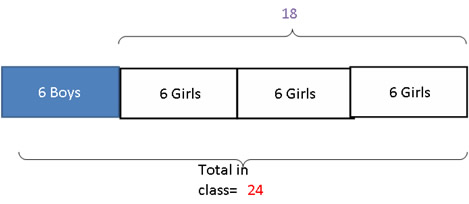‘Undertaking the new maths curriculum’
The Department for Education (DfE) is concerned that England is lagging behind other countries in maths. It is calling for us to be more ambitious in this area of our children’s education, to follow the example set by higher performing countries such as Singapore. Thousands of jobs require some level of maths and it’s not just useful for our  careers. Maths is used every day. The language of scientists and engineers, mathematics is used in business, finance, for paying the household bills and buying groceries. Whether it’s managing your monthly budget or a part of your job, mathematics has a place in everyone’s life.
careers. Maths is used every day. The language of scientists and engineers, mathematics is used in business, finance, for paying the household bills and buying groceries. Whether it’s managing your monthly budget or a part of your job, mathematics has a place in everyone’s life.
England’s Education Secretary, Michael Gove, said that since the 1990s, test performances had been “at best stagnant, at worst declining”. With the new curriculum coming into effect this September, Tim Handley, maths and ICT lead at Woodland Primary Academy, Maths Specialist Teacher and contributor at Rising Stars, shares his advice on preparing for the new maths curriculum.
The new curriculum is certainly more challenging, but with the right approach and support it is most definitely achievable. Here is my advice to schools and teachers taking on the new maths curriculum.
Understand and teach the aims of the new curriculum
It is vital that you read the introduction and aims of the new maths curriculum. In my opinion, this is the crucial part. It is a section that is often overlooked by teachers, yet this section offers many ways to get around some of the perceived difficulties of the curriculum. I would advise that you pay particularly close attention to the aims of the new curriculum as this is the key to understanding the objectives of the new programme of study, which the government has made clear they expect to be present through all maths teaching. This isn’t referenced in the year by year content of the curriculum, so make sure you understand this. The aims of the new curriculum outlined by the government are:
- Become fluent in the fundamentals of mathematics, including through varied and frequent practice with increasingly complex problems over time, so that pupils develop conceptual understanding and the ability to recall and apply knowledge rapidly and accurately.
- Reason mathematically by following a line of enquiry, conjecturing relationships and generalisations, and developing an argument, justification or proof using mathematical language.
- Solve problems by applying their mathematics to a variety of routine and non-routine problems with increasing sophistication, including breaking down problems into a series of simpler steps and persevering in seeking solutions.
Mathematics is an interconnected subject in which pupils need to be able to move fluently between representations of mathematical ideas. The programmes of study are, by necessity, organised into apparently distinct domains, but pupils should make rich connections across mathematical ideas to develop fluency, mathematical reasoning and competence in solving increasingly sophisticated problems.
It is also important to note that one of the messages of the new curriculum is that teachers have been given the autonomy to teach any course content, irrespective of key stage; just because it’s Year 3 content, doesn’t mean you have to teach it in Year 3 if a student isn’t ready for it. For example, a Year 3 objective can be taught at any point in Key Stage 2. The important message is teach the content when children are conceptually ready for it. Schools need to be receptive to their own students and every school and every student is different. Teachers need to understand if you use the freedom provided by the aims of the curriculum, teaching the new curriculum becomes less daunting.
It is also worthwhile noting that academies are provided with much greater flexibility, as they can create their own curriculum. It is obviously a good idea for them to base their curriculum around the new National Curriculum, as after all, children will still be tested against the national curriculum. However, this extra freedom allows schools to adapt the curriculum to their children, and perhaps remove some elements whilst adding in others to create a truly bespoke curriculum.
Using practical resources
To help children get a better understanding of maths, it’s important to incorporate models, images and practical resources. We need to help students develop a true conceptual understanding of maths so they can take on the new curriculum with ease. Resources such as bead strings, number lines, 100 squares, thinking strips, and the ‘bar model’ are ideal representations of mathematical concepts. The ‘bar model’ is based on work by American psychologist, Jerome Bruner, and is now used extensively and successfully in schools in Singapore.
In a class, 18 of the children are girls. A quarter of the children in the class are boys. Altogether, how many children are there in the class? [Taken from 2012 SATS paper.]
Children first draw a bar to represent the whole class. Mark on the known information (¼ of the class are boys, the rest, which must be ¾, have got to be girls, and there are 18 girls in total). It is then clear that each quarter of the class has 6 children in it, and children would bring this onto their representation, and therefore be able to see the total in the class is 24.

Support and training
Schools should make use of any support or training offered to them. Whether it’s from publishers, local authorities or Maths Specialist Teachers (MaST), schools need to avail of this assistance to ensure their staff are ready to teach the new curriculum. Schools should also work together, especially with the schools in their cluster. For example, I have just supported my school cluster in developing a common calculation policy, which runs from EYFS to Year 8. The National Centre for Excellence of Teaching Mathematics (NCETM) is producing a range of various free online resources and there are also a growing number of NCETM accredited professional development leads, who have been trained by the NCETM to support schools taking on the new curriculum.
Make connections through problem solving and reasoning
The aims of the new curriculum put problem solving and reasoning at the heart of mathematics teaching. It is vital that children develop mathematical skills and understand maths, rather than just being able to ‘do’ maths. To enable students to do this, we need to get them to understand connections through problem solving and reasoning, so it’s important to encourage children to make conjectures, spot patterns and help them understand the connections between areas of maths and generalisations. One way in which this can be achieved is through the use of key questioning constructs. For example “What’s the same and what’s different about a square and a rectangle?” or “Give me hard and easy example of an equivalent fractions? What makes it hard/easy?” You can also ask children to convince you of an odd one out in a set of numbers, objects or shapes, or to provide a peculiar, obvious and general example of a criteria.
Problem solving, reasoning and conceptual understanding all play an important role in mathematics and allow students to understand and apply maths. This is extremely important to remember when teaching this subject but will help teachers and students take on the challenge of the new maths curriculum. It may be a challenge but our teachers and schools are in a strong position to take this on and increase the standards of mathematics amongst our students.
Maths is all around us. It’s everywhere from checking time tables, using the various modern technologies and setting our alarm clocks. Understanding maths can help us to budget, shop wisely and enjoy games and puzzles. It’s important we instil this knowledge in our students as it’s not just for the future scientists and engineers, maths is for everyone.
About Tim Handley
Tim Handley is the Maths and ICT lead at Woodlands Primary Academy in Great Yarmouth, where he sits on the strategic leadership team. He is a qualified Maths Specialist Teacher (MaST) and is an accredited NCETM [National Centre Excellence in the Teaching of Mathematics] Professional Development Lead (Primary). He also writes the problem solving and reasoning resources for Rising Stars.
About Rising Stars
Established in 2002, Rising Stars UK Ltd is the largest independent publisher in the UK. Its portfolio consists of more than 1000 titles of educational books and software, each of which is carefully linked to the National Curriculum. Rising Stars has made an unprecedented investment in education and as a result has been able to develop an award-winning range of books, teaching resources and software that support teachers and learners in both the UK and across the world. The quality of Rising Stars’ resources has been recognised through many awards, including the Education Resources Award for best Supplier of the Year: with over £3million annual turnover (2013), Naace ICT Impact Award (2013), highly commended for Switched on ICT for Key Stage 1 at the 2013 Bett awards and winner of the Bett Awards 2014, in the Early Years Solutions category for Switched on ICT in the Early Years.
All Rising Stars’ products are created in partnership with teachers and learners. Strong relationships have been formed with organisations including nasen (The National Association for Special Educational Needs), NACE (The National Association for Able Children in Education), Computing at School (CAS) and the Guardian Teacher Network. Other publishing areas include assessment, revision and test preparation, curriculum books and software plus a wide range of reading resources for reluctant and less able readers. Every book or piece of software created meets a specific need and is written, tested and reviewed by practising teachers, educational advisers and subject experts.
www.risingstars-uk.com
For further information:
Leah Feagan Leah.Feagan@mangomarketing.com
Alex Maher Alex.Maher@mangomarketing.com
Mango Marketing
1B Quadrant Courtyard, Quadrant Way
Weybridge, Surrey, KT13 8DR
Tel: 01932 829077
Email: leah.feagan@mangomarketing.com
Please submit your comments below.
Do you have something to say about this or any other school management issue which you'd like to share? Then write for us!






